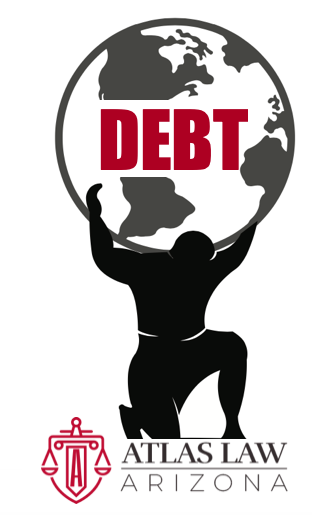
WIPE OUT DEBT
Atlas Law will take your financial burdens off your shoulders
Bankruptcy can be a viable solution for individuals burdened by substantial debt, offering relief from financial strain and protection from creditor actions. It’s important to weigh the benefits and consequences carefully and seek professional advice to determine the best course of action based on your unique circumstances. Contact Atlas Law Firm to schedule a free consultation with an experienced lawyer who will explain your options, and navigate you through the debt-relief process.
Schedule your free debt-relief consultation with an Atlas Law Arizona top-rated attorney.
BANKRUTPTCY


Chapter 13 Bankruptcy
Using a lawyer to file Chapter 13 bankruptcy can significantly benefit individuals navigating the complexities of the bankruptcy process. A bankruptcy lawyer can assess your financial situation, evaluate whether Chapter 13 bankruptcy is the best option for you, and explain the process in detail. Atlas Law Attorneys can provide personalized advice based on your specific circumstances and help you understand your rights and responsibilities.
Chapter 13 bankruptcy provides a structured way for individuals to repay debts over time while retaining their assets and achieving financial stability. It offers a legal framework to reorganize finances and manage debt under the oversight and protection of the bankruptcy court.

Chapter 7 Bankruptcy
Atlas Law Firm Chapter 7 bankruptcy attorneys provides you with knowledgeable guidance, legal protection, and peace of mind throughout the bankruptcy process. They can streamline the process, advocate on your behalf, and increase the likelihood of a successful outcome that provides relief from overwhelming debt by eliminating debt. What can you expect from the Atlas Law Firm Bankruptcy legal team? Legal expertise, personalized advice, preparation and documentation, protection from creditors representation in Bankruptcy Court, asset protection, and post-bankruptcy guidance
Our experienced legal team understands the nuances of the bankruptcy code, court procedures, and local rules, ensuring that your case is handled correctly and efficiently.
OTHER AREAS OF PRACTICE


Debt Settlement & Relief
Debt settlement and debt relief are strategies designed to help individuals and businesses manage and reduce their outstanding debts. Debt settlement involves negotiating with creditors to accept a reduced amount as full satisfaction of a debt owed. This can be a viable option for individuals who are unable to pay their debts in full but can offer a lump sum payment or structured payments over time.
Typically, a debtor or a debt settlement company negotiates with creditors on behalf of the debtor. Negotiations aim to reach an agreement where the creditor agrees to accept less than the total amount owed. Once an agreement is reached, the debtor makes the negotiated payment, and the debt is considered settled.
A potential consequence to debt settlement is its impact on credit scores, as settled debts are usually reported as “settled” rather than “paid in full.” Creditors may also report forgiven amounts as taxable income, which could result in tax implications for the debtor.
The goal of debt relief is to help debtors regain financial stability, manage debt effectively, and avoid bankruptcy when possible. It provides options for individuals struggling with overwhelming debt to find a manageable path toward debt resolution.
Some debt relief strategies include debt consolidation, combining multiple debts into a single loan with lower interest rates or a more manageable repayment schedule. Another effective method for debt relief is a debt management plan, working with a credit counseling agency to negotiate lower interest rates and payments with creditors to pay off debts over time. Bankruptcy is another option for debt relief. Filing for bankruptcy under Chapter 7 or Chapter 13 to eliminate or restructure debts, providing a fresh financial start for the debtor.

Foreclosure Defense
Foreclosure and bankruptcy are closely related processes that can interact in several ways, particularly when homeowners face financial distress and difficulty making mortgage payments. Here’s how foreclosure and bankruptcy intersect:
- Automatic Stay: One of the primary benefits of filing for bankruptcy, whether Chapter 7 or Chapter 13, is the automatic stay. This legal injunction immediately halts most creditor actions, including foreclosure proceedings. The automatic stay provides temporary relief, giving homeowners time to assess their options and potentially negotiate with their mortgage lender.
- Chapter 7 Bankruptcy:
- Impact on Foreclosure: Chapter 7 bankruptcy is primarily designed to discharge (eliminate) unsecured debts, such as credit card debt and medical bills. It does not provide a mechanism to catch up on missed mortgage payments directly. However, the automatic stay can temporarily stop foreclosure proceedings. If a homeowner wants to keep their home and is behind on mortgage payments, they may need to negotiate a repayment plan with their lender outside of bankruptcy or consider Chapter 13 bankruptcy.
- Chapter 13 Bankruptcy:
- Repayment Plan: Chapter 13 bankruptcy allows homeowners with regular income to create a repayment plan to catch up on overdue mortgage payments over a period of three to five years. This can prevent foreclosure by restructuring past due amounts into the repayment plan while maintaining current mortgage payments.
- Automatic Stay: Similar to Chapter 7, filing for Chapter 13 triggers an automatic stay that halts foreclosure proceedings. Homeowners can use this time to propose a feasible repayment plan to the bankruptcy court and negotiate with their lender.
- Post-Bankruptcy Impact: Successfully completing a Chapter 13 bankruptcy plan can help homeowners retain their homes and avoid foreclosure. However, bankruptcy may impact credit scores and future borrowing ability. It’s important to work with an experienced bankruptcy attorney to understand the implications and explore alternatives to foreclosure.

Tax Resolutions Lawyers
When considering hiring a tax resolution lawyer, it’s important to choose a qualified attorney with experience in tax law and resolution strategies. They can provide guidance, advocacy, and peace of mind when dealing with challenging tax situations and disputes with tax authorities.
Tax resolution lawyers specialize in assisting individuals and businesses with tax-related issues and disputes with tax authorities, such as the IRS (Internal Revenue Service) in the United States. Here’s an overview of what tax resolution lawyers do and when you might need their services:
- Tax Debt Negotiation: Tax resolution lawyers negotiate with tax authorities on behalf of their clients to resolve tax debts, including negotiating installment agreements, offers in compromise (OIC), and penalty abatements. They advocate for the best possible outcome based on the client’s financial situation and tax liabilities.
- Audit Representation: If you or your business is being audited by the IRS or state tax authorities, a tax resolution lawyer can represent you during the audit process. They ensure compliance with audit procedures, provide guidance on responding to audit inquiries, and work to resolve any issues that arise.
- Tax Compliance and Planning: Tax resolution lawyers advise clients on tax compliance matters, helping them understand their tax obligations and plan for tax efficiency. They can provide strategic advice on tax planning to minimize future tax liabilities and avoid potential audit triggers.
- Appeals and Disputes: If you disagree with a tax assessment or decision made by tax authorities, a tax resolution lawyer can represent you in appeals and disputes. They prepare and submit appeals, gather supporting documentation, and argue your case before administrative bodies or tax courts.
- Offer in Compromise (OIC): An OIC is an agreement between a taxpayer and the IRS to settle tax debt for less than the full amount owed. Tax resolution lawyers assess your eligibility for an OIC, prepare the necessary documentation, and negotiate with the IRS to achieve a favorable settlement.
- Tax Liens and Levies: If you are facing tax liens (legal claims on your property due to unpaid taxes) or levies (seizure of assets to satisfy tax debts), a tax resolution lawyer can intervene to negotiate release or removal of liens and stop levies through negotiation or restructuring of payment arrangements.


Credit Score Assistance
A bankruptcy attorney at Atlas Law understands their crucial role in helping you understand, manage, and rebuild your credit after bankruptcy. They provide personalized advice and support throughout the process, ensuring that you have the tools and knowledge to effectively manage your credit score and financial well-being moving forward.
Assistance with credit score improvement and management after bankruptcy includes understanding credit reports. An attorney will ensure that all debts discharged through bankruptcy are accurately reflected on your credit reports. Next, we will provide credit rebuilding strategies. After bankruptcy, it’s important to begin rebuilding your credit. A bankruptcy attorney can provide guidance on establishing new lines of credit, such as secured credit cards or small installment loans, which can help demonstrate responsible credit management over time.
A bankruptcy attorney will educate you on credit scores and explain how credit scores are calculated and what factors influence your score, such as payment history, credit utilization, length of credit history, types of credit used, and new credit inquiries. The professional legal team at Atlas Law helps with post-bankruptcy financial planning. Beyond immediate credit repair, we help develop a financial plan for the future. This includes budgeting, saving, and managing expenses to maintain financial stability and avoid future debt problems. Dealing with creditors is an effective means of managing your financial future. If creditors continue to report inaccurate information or harass you after bankruptcy, your attorney can intervene on your behalf to ensure compliance with bankruptcy laws and protections. Finally, Long-term guidance is important to your credit and financial clean slate with out debt. Discuss with your attorney financial matters, including strategies to improve creditworthiness over time and achieve long-term financial goals.
